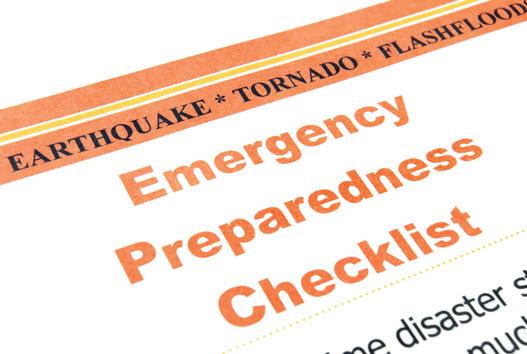
7 minute read
“A Culture of Preparedness”: Get Needto-Know Storm Safety and Insurance Advice
Maxim Elramsisy | California Black Media
Wilken said consuming contaminated food or water can make you very sick. “Other than undamaged cans or metal pouches, you should throw out any fresh or packaged food that was touched by flood water.” The outside of the containers should still be disinfected. He recommends using one tablespoon of bleach into one gallon of water for cleaning surfaces and utensils. Importantly, he notes, “NEVER MIX CLEANERS,” as it may cause dangerous chemical
Advertisement
Be careful and know the source of the water that you consume. Sealed bottled water can be safe, but if the surface of the bottle has been contaminated, boil it for one minute. If you get municipal tap water, listen to your local authorities regarding safety. If you get your water from a well, get in touch with local environmental health, or your water department for advice on how to test and disinfect your water source.
Navigate California’s Social Safety Net
Go to www.cdss.ca.gov for state disaster assistance and additional resources. Apply for federal help through FEMA Disaster Assistance at DisasterAssistance.gov or call to do, but also getting a degree.” In 2019, Holden introduced a similar bill, the college Athlete Civil Rights Act, which was signed into law by Gov. Newsom. That bill required schools in the state to inform student athletes about their rights and made it illegal for schools to retaliate against athletes who report the school for violations of any kind. years, we’ve collected and analyzed information on nearly 12 million police encounters in our state.” refutes the RIPA Board’s report.
At a press conference held at the Pasadena Rose Bowl last week, Assemblymember Chris Holden (D-Pasadena) introduced Assembly Bill (AB) 252, called the College Athletic Protection Act.

If the Legislature passes the bill, it will expand and reinforce protections for college athletes, says Holden, who also serves as Assembly Appropriations Committee chair.
The current report, sheds light on a study of millions of vehicular and pedestrian stops conducted from Jan. 1, 2021, to Dec. 31, 2021, by 58 law enforcement agencies in California — a notable expansion from the 18 participating agencies documented in the previous report released by RIPA last July.
At the conclusion of a stop, officers are required to report the outcome such as no action taken, warning or citation given, or arrest. For individuals perceived as Black, the 2023 report stated, officers reported “no action taken” approximately 2.2 times as often as they did for individuals viewed as White. The report concluded that there is an indication that a higher rate of those stopped who were perceived as Black were not actually engaged in unlawful activity.
In addition, Black children and adolescents (10 to 14 and 15 to 17 years old) were detained curbside or in a patrol car, searched, or handcuffed during a higher percentage of stops than any other combination of perceived race or ethnicity and age groups.
PORAC’s 2023 annual report, “A Critical Analysis” by Dr. Brian L. Withrow, dated Jan. 2, 2023, states that “California is experiencing a public safety crisis” while “law enforcement departments are understaffed, underfunded, and underappreciated.”
“Unfortunately, California’s Racial and Identity Profiling Advisory Board (RIPA) has pursued an inherently flawed approach to assessing police stop data that both misrepresents the data itself and misleads the public to believe things that simply are not true,” Withrow said. “Californians deserve appropriate scrutiny of officer behavior, but they also deserve the truth. To do otherwise would only sow further division between law enforcement and the communities they risk their lives every day to serve.”
To date, the traffic stop data made available by the RIPA Board is the nation’s largest and most comprehensive collection effort under which all state and local law enforcement agencies will be required to report to the California Department of Justice by April 1, 2023.
“As a former college basketball player at San Diego State, I know how close you can come to an injury taking away not only the game you love to play, but also your opportunity to finish college,” said Holden. “So, we look at this bill as going further and establishing some important safeguards for athletes as they are out there enjoying what they love
Subscribe online to The San Bernardino AMERICAN News and get your newspaper Weekly! ($59 a year) Visit our website: sb-american.com or Mail check or money order to: PO Box 837 Victorville, CA 92393
Holden represents Assembly District 41, where Pasadena, “The City of Champions,” is the political center. It is a town that prides itself on its appreciation for sports and the many accomplished athletes who have called the area home, including baseball great Jackie Robinson and several NFL players who have excelled in various sports and made it to the Super Bowl,
At least 20 people lost their lives due to the “Parade of atmospheric rivers” drenching California landscapes. The historic storm system, which has caused flooding, mudslides, levee breaches, heavy snow, hurricane force winds, and even a tornado, began late last year and has continued into the new year.
On Jan. 12, Gov. Gavin Newsom requested an expedited major disaster declaration for California, which was approved by President Biden on Jan. 14, in Merced, Sacramento, and Santa Cruz counties. On Jan. 18, Santa Barbara, San Luis Obispo and Monterey counties were also approved.
A Major Disaster declaration means damage is beyond the combined capabilities of local and state governments to respond. As a result, affected areas will be eligible for a range of federal assistance programs.
“The big storm event, the big weather system that's been creating what has been called atmospheric rivers is coming to an end,” said Diana CroftsPelayo, Assistant Director of Crisis Communications and Public Affairs at the California Office of Emergency Services. “It's not too late to be prepared for the next emergency. It really is incumbent on us all to talk as loved ones, family and friends about emergency plans, should another storm happen. Have an emergency kit read if you need to leave your house quickly. Communicating and checking in with loved ones will help be part of this overall culture of preparedness and resilience.”
Returning Home After a Flood
When returning home following a flood “the best advice is really to avoid flood water,” says Jason Wilken, Career Epidemiology Field Officer at the U.S. Centers for Disease Control (CDC).
“It can contain toilet waste and
The report also details that law enforcement officers used force against people perceived as Black at 2.2 times the rate of individuals perceived as White. For those perceived as Latino, officers used force against them at 1.3 times the rate of individuals perceived as White.
Fifty-eight agencies reported over 3.1 million stops during the data collection 12-month study, with the California Highway Patrol (CHP) conducting the most stops of any single agency (54.9%). In addition, individuals perceived to be Hispanic/Latinos (42.4%), White (30.7%), or Black (15.0%) comprised the majority of stopped individuals.
“Coupled with a strong set of evidence-based recommendations to the Legislature, local jurisdictions, and policing agencies, such as an end to pretext stops and consent searches, our hope is that this year’s report will continue to push California towards building communities that are safer for all,” Ochoa stated.
The Peace Officers Research Association of California (PORAC), a coalition of over 77,000 public safety workers in more than 950 associations, released its own study, which
In addition to providing an in-depth look into policing in 2021, the Board’s report lists a wide range of recommendations related to policing, with a focus on the impact of pretextual stops, law enforcement interactions with youth, civilian complaint processes, and training on racial and identity profiling.
The RIPA Board insists that the report is consistent with the disparities observed in prior years’ data with respect to perceived race, gender, and disability status.
“California is leading the nation in its effort to collect data on police-citizen interactions and to foster transparency and make progress towards fair, equitable, effective policing,” said Steven Raphael, Co-Chair of the Board and Professor of Public Policy at UC Berkeley. “Data collected under RIPA provides important information to the public, to legislators, and to law enforcement to guide policy and practice throughout the state.”
For more on RIPA and other criminal justice data, members of the public are encouraged to visit OpenJustice, a California Department of Justice, datadriven public initiative that works to increase access to criminal justice data and support the development of public policy.
“A
Culture of Preparedness”: Get Need-to-Know Storm Safety and Insurance Advice...continued
1(800) 621-3362. To learn more about help, local resources, or for app
“For the over 5 million individuals that are currently participating in Calfresh, [including] those who have had power outages related to these storm events and have lost the food resources that they have purchased, can get those replaced within 10 days of their loss by just contacting their county social service agency,” says Kim Johnson, Director of California Department of Social Services.
A telephone number, “The Hope Line” 1(833)317-HOPE (4673), was created “for individuals who are impacted to simply navigate this change,” she says.
Seniors facing isolation can call “The Friendship Line” at 1(888)670-1360.
Be Prepared. Help The Vulnerable
The importance of timely information cannot be understated. Be aware of your surroundings. Sign up for free emergency alerts at www. CalAlerts.org, authorities say.
“Anytime there are these types of disasters, there are individuals who are disproportionately impacted by those disasters,” said Vance Taylor, Chief of the Office of Access and Functional Needs at the Office of Emergency Services. “We’re talking about older adults, people with disabilities, people who are economically disadvantaged, or transportation disadvantaged, people with access or functional needs, and so to ensure that our emergency management systems, programs and services are being rolled out in way that is equitable and accessible to everyone is a top priority,” said Taylor.
Insurance Quick Tips
Comprehensive auto insurance covers damage to your automobile – and “loss of use” coverage could reimburse a rental car if you need one.
Home and renters’ insurance covers damage from fallen trees and wind. Mudslides and debris flow caused by landscape scarring from a previous wildfire is also covered by home and renters' insurance.
Flood insurance is sold separately through the National Flood Insurance Program and takes effect 30 days after purchase in most cases.
Tips for Filing Insurance Claims:
· Make sure you have a copy of your policy
· Contact your insurance agent
· Log conversations with your insurance company in a “claims diary,” including who you talked to, what you talked about, what agreements were made
· Track all expenses while living away from home (hotel bills, restaurant expenses)
· Take pictures/video of the damages, but don't start the remediation/cleaning until the adjuster conducts an inspection
· Don't get scammed. Use licensed contractors
For more information contact the Department of Insurance for help at 1(800)927-4357 or visit www.insurance.ca.gov.








